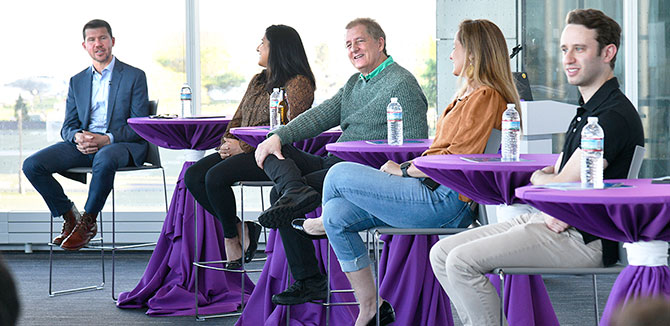Exploring the Wide World of Biotechnology
Biotech Nexus, an annual event hosted by Northwestern Engineering's Master of Biotechnology Program (MBP), showcased the array of opportunities available in the biotech space.

What is your unfair advantage?
That was the question Jeff Fairman asked attendees at Biotech Nexus, an annual gathering hosted by Northwestern Engineering's Master of Biotechnology Program (MBP). Fairman is the founder and vice president for research at Vaxcyte, a vaccine company developing a pneumococcal vaccine.
Fairman posed the question as a way to get audience members thinking about innovation, entrepreneurship, and what it takes to create a successful company.
"When you're starting a company, there are dozens of companies out there in a similar field that have way more people and way more money," he said. "You better have an unfair advantage over those competitors or else they're just going to come in and swamp you."
In the case of Vaxcyte, Fairman said the company's advantage is site-specific conjugation and cell-free technology to make proteins.
The question was also one for current MBP students to consider as they secure jobs after graduation. Knowing what differentiates them from other job candidates can be the difference between securing a role or continuing to apply for other positions.
Differentiation and job prospects were just two of a number of topics touched on at the event, which featured a panel discussion followed by a networking opportunity. Joining Fairman on the panel was:
- Kanika Changela (MBP '07), quality systems manager at Siemens Healthineers
- Marilene Pavan, innovation manager at LanzaTech
- Michael Schultz, director of venture operations at Portal Innovations
The conversation was moderated by Professor Joshua Leonard, a co-founder of Northwestern's Center for Synthetic Biology and founder of biotech startup Syenex.
The event is designed to show attendees the wide array of opportunities available to students with backgrounds in biotechnology. Each of the panelists represented a different category of biotech.
As an MBP graduate, Changela explained how she uniquely understood students’ experiences in the program and questions they might consider as they approach graduation.
Changela focused on the quality and regulatory affairs field for the medical device industry after graduation. With more than 17 years of experience in the field, her responsibilities range from FDA and regulatory body inspections to spearheading product quality and process improvement initiatives.
Pavan is a synthetic biology strategy manager at LanzaTech, a carbon recycling technology company focused on converting carbon-based gas into biofuels, chemicals, and materials. LanzaTech has several MBP alumni at the company and collaborates with the program in different capacities, including offering tours of the facility and networking opportunities.
Pavan recommended students take advantage of as many of these opportunities as possible.
"Exposure is very important," Pavan said. "Having exposure to the science that you want to develop, either in academia or in a startup or small company, it's super useful."
Schultz agreed.
His company, Portal Innovations, is an early-stage biotech and medtech venture capital firm that routinely meets with scientists and budding entrepreneurs. Beyond getting exposure to the science, he strongly encouraged attendees to network as much as possible, both in person and virtually on platforms like LinkedIn.
"Coming from a scientific, technical background, most of us are probably natural introverts," he said. "Everybody's here to meet people and it's going to feel awkward. Just push through it, because that network is what's going to move you through your career."

